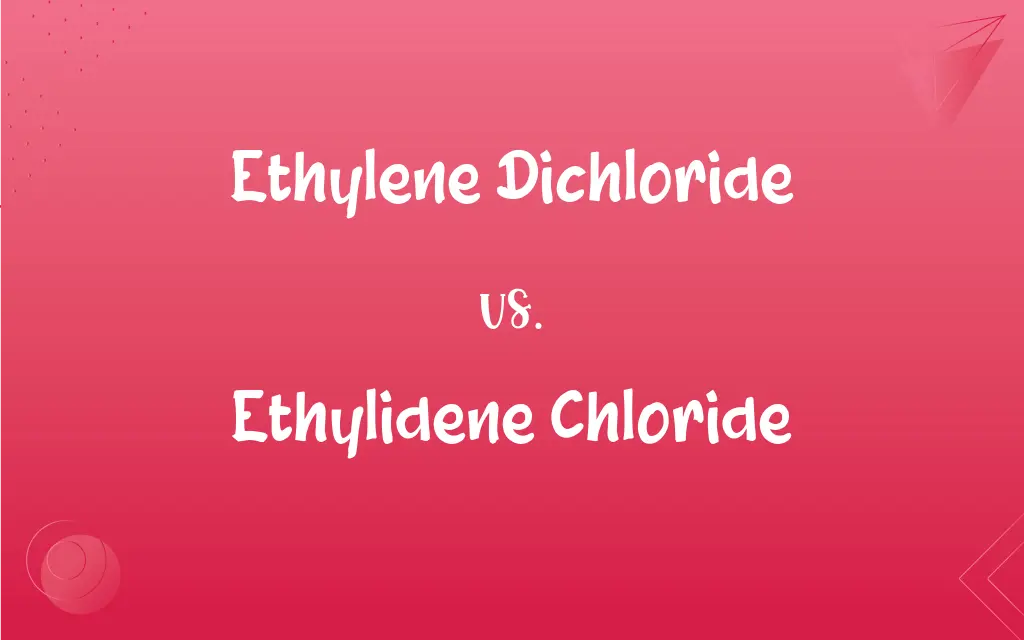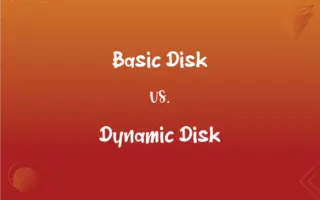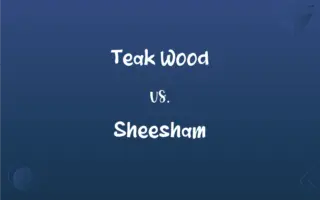Ethylene Dichloride vs. Ethylidene Chloride: What's the Difference?
Edited by Aimie Carlson || By Harlon Moss || Published on January 28, 2024
Ethylene dichloride (EDC) is a chlorinated hydrocarbon used mainly in PVC production, while ethylidene chloride is a less common isomer used in organic synthesis.

Key Differences
Ethylene dichloride is a chlorinated hydrocarbon with two chlorine atoms attached to a two-carbon ethylene chain. Ethylidene chloride, however, has a slightly different structure where the chlorine atoms are attached to a single carbon atom.
Ethylene dichloride is primarily used in the production of vinyl chloride, the precursor to PVC. Ethylidene chloride is used in more specialized organic synthesis applications.
Ethylene dichloride appears as a clear, colorless liquid with a sweet odor and is highly volatile. Ethylidene chloride also presents as a colorless liquid but with different boiling and melting points due to its distinct structure.
Ethylene dichloride is toxic and poses environmental hazards if not handled properly. Ethylidene chloride, while also toxic, is used less frequently, thus having a more limited environmental impact.
Ethylene dichloride is produced in larger quantities due to its industrial applications, particularly in PVC manufacturing. Ethylidene chloride is less commonly produced and is more niche in its usage.
ADVERTISEMENT
Comparison Chart
Chemical Structure
Two chlorine atoms on a two-carbon chain.
Chlorine atoms attached to a single carbon atom.
Primary Use
Production of vinyl chloride for PVC.
Specialized in organic synthesis.
Physical Properties
Clear, colorless liquid, highly volatile.
Colorless liquid, different boiling point.
Safety Concerns
Toxic, environmental hazards.
Toxic, but limited impact due to lesser use.
Production Volume
Produced in large quantities.
Less commonly produced.
ADVERTISEMENT
Ethylene Dichloride and Ethylidene Chloride Definitions
Ethylene Dichloride
Toxic and poses environmental hazards.
Proper disposal of ethylene dichloride is essential to prevent environmental damage.
Ethylidene Chloride
Colorless liquid with distinct boiling and melting points.
Ethylidene chloride's physical properties are crucial for its specific applications.
Ethylene Dichloride
Known for its sweet odor.
Ethylene dichloride's sweet odor makes it identifiable in industrial settings.
Ethylidene Chloride
Less frequently produced due to niche applications.
Due to its specialized use, ethylidene chloride is not mass-produced like ethylene dichloride.
Ethylene Dichloride
A chlorinated hydrocarbon used in PVC production.
Ethylene dichloride is vital in manufacturing PVC pipes.
Ethylidene Chloride
A less common isomer of dichloroethane.
Ethylidene chloride is an isomer not as widely used as its counterpart.
Ethylene Dichloride
Appears as a clear, colorless, volatile liquid.
Ethylene dichloride must be handled carefully due to its volatility.
Ethylidene Chloride
Structurally different from ethylene dichloride, with chlorine on a single carbon.
Ethylidene chloride's structure makes it unique for certain chemical processes.
Ethylene Dichloride
Has two chlorine atoms attached to an ethylene chain.
The structure of ethylene dichloride includes two chlorine atoms.
Ethylidene Chloride
A chlorinated hydrocarbon used in organic synthesis.
Ethylidene chloride is utilized in specialized chemical reactions.
FAQs
What are the main uses of Ethylene Dichloride?
Primarily used to produce PVC and as a solvent.
What is Ethylene Dichloride?
A colorless liquid used primarily in the production of vinyl chloride.
How is Ethylene Dichloride produced?
Typically produced by the reaction of ethylene with chlorine.
What are the health effects of Ethylene Dichloride exposure?
Can cause respiratory issues, skin irritation, and in severe cases, organ damage.
Is Ethylene Dichloride toxic?
Yes, it can be toxic if ingested, inhaled, or upon prolonged skin contact.
Does Ethylene Dichloride have environmental impacts?
Yes, it can contaminate water and soil, and is toxic to aquatic life.
How is Ethylene Dichloride transported?
Usually transported in bulk using tankers or rail cars.
Is Ethylene Dichloride flammable?
Yes, it is highly flammable.
What is Ethylidene Chloride?
A colorless liquid, also known as 1,1-dichloroethane, used in chemical synthesis.
How is Ethylene Dichloride disposed of?
Must be disposed of as hazardous waste according to local regulations.
Is Ethylidene Chloride toxic?
Yes, it can be harmful if inhaled or ingested, and irritates the skin and eyes.
Can Ethylidene Chloride be found in consumer products?
Rarely, as it is primarily used in industrial settings.
What are the emergency procedures for Ethylidene Chloride spills?
Evacuate area, wear protective gear, and contain the spill if safe to do so.
Can Ethylene Dichloride be used in pesticides?
Historically, it was used in fumigants but is less common now.
What are the uses of Ethylidene Chloride?
Used as a solvent and in the production of certain chemicals.
How should Ethylidene Chloride be stored?
In a cool, dry, well-ventilated area away from heat or open flame.
Does Ethylidene Chloride have an odor?
Yes, it has a faint, sweet odor.
How is Ethylidene Chloride different from Ethylene Dichloride?
It has a different chemical structure, with both chlorine atoms on the same carbon.
What are the environmental impacts of Ethylidene Chloride?
Can contribute to air and water pollution and is harmful to aquatic life.
How is Ethylidene Chloride manufactured?
Typically produced by the chlorination of ethane or from ethylene dichloride.
About Author
Written by
Harlon MossHarlon is a seasoned quality moderator and accomplished content writer for Difference Wiki. An alumnus of the prestigious University of California, he earned his degree in Computer Science. Leveraging his academic background, Harlon brings a meticulous and informed perspective to his work, ensuring content accuracy and excellence.
Edited by
Aimie CarlsonAimie Carlson, holding a master's degree in English literature, is a fervent English language enthusiast. She lends her writing talents to Difference Wiki, a prominent website that specializes in comparisons, offering readers insightful analyses that both captivate and inform.































































